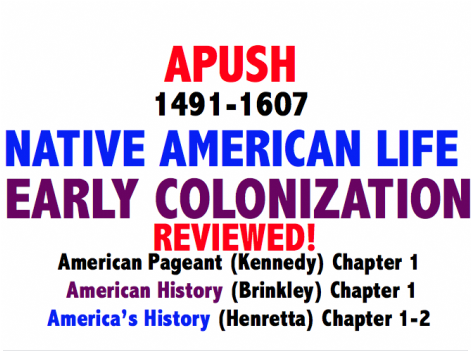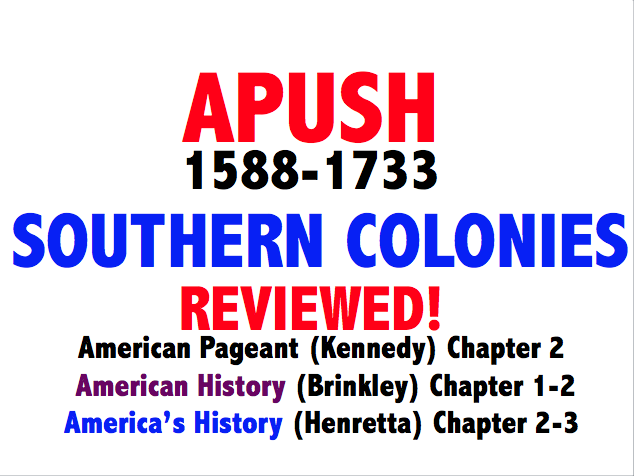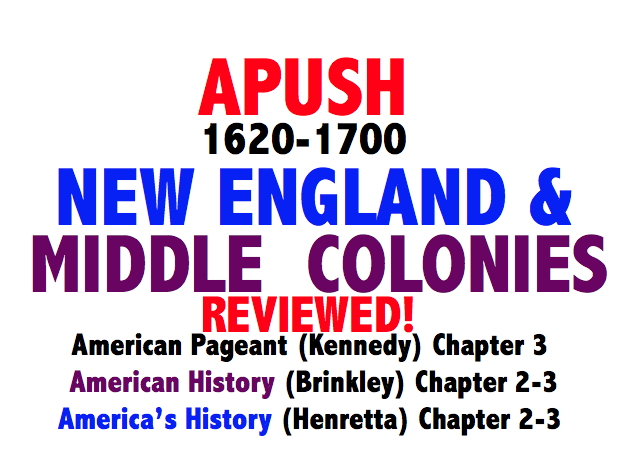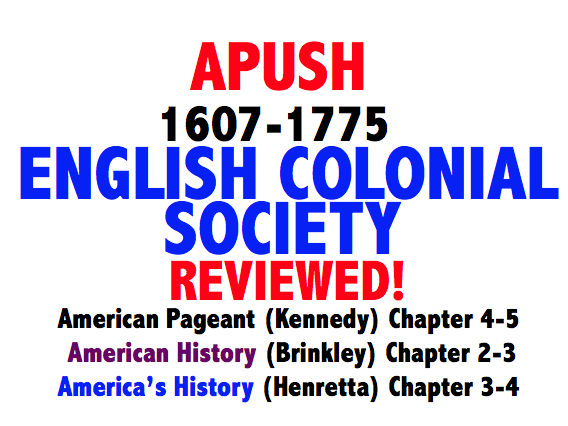2019 Summer Assignment:
A note from Mr. Jocz: Completing this summer work will save you a ton of time at the beginning of the semester. By completing Chapters 1-5 you will have less homework when you return to school and the content knowledge you have on day 1 will ease your transition into this college level course.
How to guide for completing APUSH Reading Notes:
https://youtu.be/Hrb3BeGaXzc
---------------------------------------------------------------------------------------------------------------------------------------------------------------------
The first week of school we will work on assignment #2 IDs. If you want to lighten your work load during your first week back you may get a head start over the summer on the IDs. These will not be collected until week 2.
Assignment #2 IDs : Download the IDs above. Complete the identifications for Chapters 1-5 in the American Pageant. (or Chapters 1-3 in American History- Brinkley, Chapters 1-4 in America's History- Henretta, etc.)
OPTIONAL RESOURCES FOR ADDITIONAL HELP
While these assignments are optional, these resources can help you if you are having difficulty understanding the material.
Optional #1: Comparing and Contrasting European Colonization. Watch the videos below and take notes. Complete the graphic organizer below.
Check out the other relevant videos on the Periods 1-2 Playlist:
Click here for more help understanding 1492-1754
British colonials review chart
DOWNLOAD HERE
It is important you know the similarities and differences between Spanish, French, Dutch, and English colonization of the Americas. These videos and the graphic organizer below will help you understand Key Concept 2.1
College Board Key Concepts Covered:
Key Concept 1.1: As native populations migrated and settled across the vast expanse of North America over time, they developed distinct and increasingly complex societies by adapting to and transforming their diverse environments.
Key Concept 1.2: Contact among Europeans, Native Americans, and Africans resulted in the Columbian Exchange and significant social, cultural, and political changes on both sides of the Atlantic Ocean.
Key Concept 2.1: Europeans developed a variety of colonization and migration patterns, influenced by different imperial goals, cultures, and the varied North American environments where they settled, and they competed with each other and American Indians for resources. (See I., III.)
Topics: Native Americans Pre-Contact & Early Colonization: 1491-1607
Native American life, Columbian Exchange, Treaty of Tordesilas, encomienda system, mestizo, Pueblo Revolt, Juan de Sepulveda, Bartolome de las Casas, mercantilism, etc.
Textbooks:
Kennedy- American Pageant Chapter 1
Brinkley- American History Chapter 1
Henretta- America’s History Chapter 1-2
CLICK BELOW TO WATCH THE VIDEO IN HD
https://www.youtube.com/watch?v=_rSS9Y53jVI
CLICK BELOW FOR PDF NOTES
![]()
| pre_contact_&_early_colonization.pdf |

College Board Key Concepts Covered:
Key Concept 2.1: Europeans developed a variety of colonization and migration patterns, influenced by different imperial goals, cultures, and the varied North American environments where they settled, and they competed with each other and American Indians for resources. ( See I, C)
II. In the 17th century, early British colonies developed along the Atlantic coast, with regional differences that reflected various environmental, economic, cultural, and demographic factors. (See II, A, D)
III. Competition over resources between European rivals and American Indians encouraged industry and trade and led to conflict in the Americas. (See III, A-E)
Key Concept 2.2: The British colonies participated in political, social, cultural, and economic exchanges with Great Britain that encouraged both stronger bonds with Britain and resistance to Britain’s control. (See II, II A-C)

Topics: Southern Colonies: 1588-1733
Spanish Armada, Roanoke, Jamestown, Joint Stock Company, Royal colony, Chesapeake, Maryland, Indentured Servants, Headright System, House of Burgesses, Bacon’s Rebellion, Anglo-Powhatan Wars, Act of Toleration, Southern Carolina, Georgia, West Indies
Textbooks:
Kennedy- American Pageant Chapter 2
Brinkley- American History Chapter 1-2
Henretta- America’s History Chapter 2-3
CLICK BELOW TO WATCH THE VIDEO IN HD
https://www.youtube.com/watch?v=y51ri8EwUZs
CLICK BELOW FOR PDF NOTES
![]()
| southern_colonies.pdf |
College Board Key Concepts Covered:
Key Concept 2.1: Europeans developed a variety of colonization and migration patterns, influenced by different imperial goals, cultures, and the varied North American environments where they settled, and they competed with each other and American Indians for resources. (See I, C)
II. In the 17th century, early British colonies developed along the Atlantic coast, with regional differences that reflected various environmental, economic, cultural, and demographic factors. (See B, C)
III. Competition over resources between European rivals and American Indians encouraged industry and trade and led to conflict in the Americas. (See A-E)
Key Concept 2.2 / I. / A: The presence of different European religious and ethnic groups contributed to a significant degree of pluralism and intellectual exchange, which were later enhanced by the first Great Awakening and the spread of European Enlightenment ideas.
Topics: New England & Middle Colonies: 1620-1700
New England colonies, Plymouth, Mayflower Compact, Mass. Bay Colony, John Winthrop, Town Hall Meeting, Roger Williams, Anne Hutchison, Pequot War, New England Confederation, King Philip’s War, New Amsterdam, New York, William Penn, Quakers, Navigation Acts, Dominion of New England, Glorious Revolution
Textbooks:
Kennedy-American Pageant Chapter 3
Brinkley- American History Chapter 2-3
Henretta- America’s History Chapter 2-3
CLICK BELOW TO WATCH THE VIDEO IN HD
https://www.youtube.com/watch?v=Ud0MyzwA_mU
CLICK BELOW FOR PDF NOTES
![]()
| new_england_&_middle_colonies.pdf |

College Board Key Concepts Covered:
Key Concept 2.1 / II: In the 17th century, early British colonies developed along the Atlantic coast, with regional differences that reflected various environmental, economic, cultural, and demographic factors. (See E)
Key Concept 2.2 / I: Transatlantic commercial, religious, philosophical, and political exchanges led residents of the British colonies to evolve in their political and cultural attitudes as they became increasingly tied to Britain and one another. (See A-D)
II. Like other European empires in the Americas that participated in the Atlantic slave trade, the English colonies developed a system of slavery that reflected the specific economic, demographic, and geographic characteristics of those colonies. (See A-C)

Topics: English Colonial Society 1607-1775
Contrast Chesapeake vs. New England colonies, slavery, triangular trade, middle passage, Stono Uprising, Half Way Covenant, Salem Witch Trials, Great Awakening, Jonathan Edwards, New Lights, Mercantilism, Navigation Acts, Salutary Neglect, Dominion of New England, Glorious Revolution, colonial politics, Zenger Case
Textbooks:
Kennedy- American Pageant 4-5
Brinkley- American History Chapter 2-3
Henretta- America’s History Chapter 3-4
CLICK BELOW TO WATCH THE VIDEO IN HD
https://www.youtube.com/watch?v=qdFj4Kn7Uyk
CLICK BELOW FOR PDF NOTES
![]()
| english_colonial_society.pdf |
![]()
| ap_summer_ids_2016.doc |
![]()
| summer_assignment_jocz_video_guiding_questions.docx |
2018 Summer Assignment:
A note from Mr. Jocz: Completing this summer work will save you a ton of time at the beginning of the semester. By completing Chapters 1-5 you will have less homework when you return to school and the content knowledge you have on day 1 will ease your transition into this college level course.
Assignment #1 Reading Notes : Download the reading guide above. Annotate the left side of the slides as you watch the videos. Read the corresponding sections of your APUSH textbook and take additional notes on the right side of the slides. Think about how this information relates to the APUSH Key Concepts .
OPTIONAL, but highly recommended:
While these assignments are optional, you are expected to be able to talk and write about these topics.
Review the APUSH Period 1 & 2 Key Concept outlines. Make sure you understand the big ideas for each of the key concepts.
Period 1 Graphic Organizer . Period 2 Graphic Organizer
Optional #2: Comparing and Contrasting European Colonization. Watch the videos below and take notes. Complete the graphic organizer below.
Answer the APUSH Video Guiding Questions HERE. Be ready to discuss in class.
Check out the other relevant videos on the Periods 1-2 Playlist:
Click here for more help understanding 1492-1754
British colonials review chart
DOWNLOAD HERE
2016 Summer Assignment:
Assignment #1: Review the APUSH Period 1 & 2 Key Concept outlines. Make sure you understand the big ideas for each of the key concepts.
Period 1 Graphic Organizer . Period 2 Graphic Organizer
Assignment #2: Comparing and Contrasting European Colonization. Watch the videos below and take notes. Complete the graphic organizer.
Assignment #4: Complete the identifications for Chapters 1-5 in the American Pageant. (or Chapters 1-3 in American History- Brinkley, Chapters 1-4 in America's History- Henretta, etc.)
Optional Assignment: Answer the APUSH Video Guiding Questions HERE. Be ready to discuss in class.
Optional Assignment: Check out the other relevant videos on the Periods 1-2 Playlist:
Click here for more help understanding 1492-1754